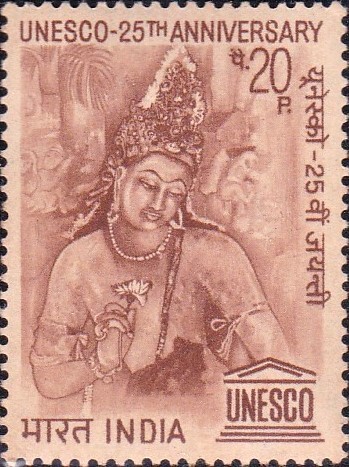
India on UNESCO 1971
A commemorative postage stamp on the 25th Anniversary of United Nations Educational, Scientific and Cultural Organization (UNESCO) : Ajanta Caves Painting :


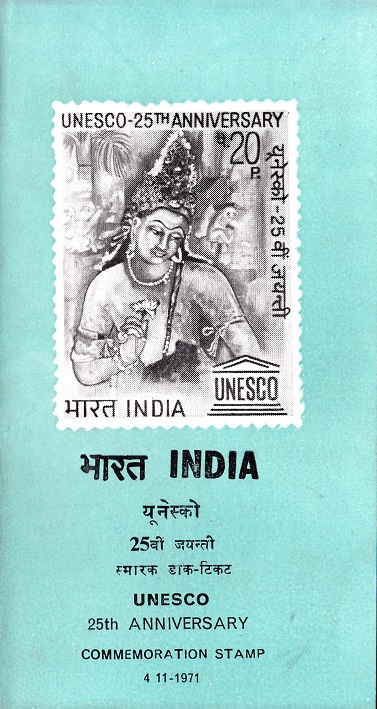 Issued by India
Issued by India
Issued on Nov 4, 1971
Issued for : India is one of the Founder-Members of the UNESCO and is actively participating in the world-wide celebrations of the 25th Anniversary of the founding of the UNESCO. The Indian P&T Department are privileged to be associated with these celebrations on the occasion of the 25th Anniversary of UNESCO. The commemorative stamp being brought out on the occasion, in India depicts a painting in the Ajanta Caves, where a UNESCO project for preservation of these paintings is in progress.
Description of Design : The design of the stamp is vertical and depicts a painting in the Ajanta Caves. The symbol of UNESCO is also shown at the bottom right hand corner.
Type : Stamp, Mint Condition
Colour : Red Brown
Denomination : 20 Paise
Overall Size : 3.91 X 2.90 cms.
Printing Size : 3.56 X 2.54 cms.
Perforation : 13 x 13
Watermark : Printed on unwatermarked adhesive stamp paper
Number Printed : 30,00,000
Number per issue sheet : 35
Printing Process : Photogravure
Designed and Printed at : India Security Press
About :
- Created in 1946, the United Nations Educational, Scientific and Cultural Organisation (UNESCO) is one of the specialised agencies of the United Nations family composed of 125 Member-States. The purpose of the Organisation as defined in its constitution is : “to contribute to peace and security by promoting collaboration among the nations through education, science and culture in order to further universal respect for justice, for the rule of law and for the human rights and fundamental freedoms which are affirmed for the peoples of the world, without distinction of race, sex, language or religion, by the Charter of the United Nations.”
- The constitution further says : “Since wars begin in the minds of men, it is in the minds of men that the defences of peace must be constructed.”
- The range of activities falling within the ambit of UNESCO is wide; in fact, this Organisation has been called “the least specialised of the Specialised Agencies.” However, the three main functions of UNESCO are : (i) international intellectual co-operation; (ii) assistance to Member-States; and (iii) promotion of peace and human rights and mutual understanding among peoples. International Intellectual Co-operation in the fields of education, science, culture and communications is the basis of all UNESCO’s work. The activities include co-ordination of international scientific efforts, standardisation of documentation procedures, clearing house services, etc. A great number of new nations which have achieved independence since UNESCO was created, have acted as a spur to redoubled efforts in operational assistance to the needy States. Such aid to Member-States at their request now occupies the major part of UNESCO’s staff and financial resources. While all UNESCO’s activities contribute, directly or indirectly, to the promotion of peace and human rights and mutual understanding, certain specific programmes in this field including scientific research on problems of race, discrimination and prejudice, encouragement of teaching about the U.N. and education for international understanding, etc. are carried out by the Organisation.
- The Declaration of Human Rights adopted by the U.N. General Assembly in 1948 was drafted with the co-operation of UNESCO. In India, UNESCO has collaborated in a number of ventures falling within the ambit of its activities. In a project financed by UNDP, UNESCO has been providing the services of foreign professors for the regional engineering colleges in India. UNESCO/UNDP have also been closely associated in the execution of a number of scientific projects in the various institutions under the Council for Scientific and Industrial Research, India. UNESCO has also provided assistance for strengthening of teaching and have also assisted in the research programmes undertaken at the centres of advanced studies at the Universities of Delhi, Punjab, Bombay and Madras and at the Indian Institute of Science, Bangalore. Earlier, the Universities of Osmania, Calcutta and Jadavpur had received assistance under this programme. The international campaign undertaken by the UNESCO to save the monuments of Nubia at Abu Simbel is well known. UNESCO is also associated with another international campaign for saving the glories of Florence and Venice for humanity. In India, UNESCO is actively associated with a project for the preservation of paintings in the Ajanta and Ellora Caves. UNESCO is also associated with the study of the possibilities of rehabilitating the temples at Srirangam.


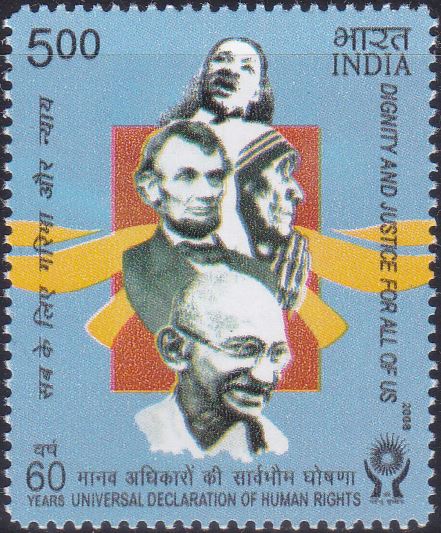

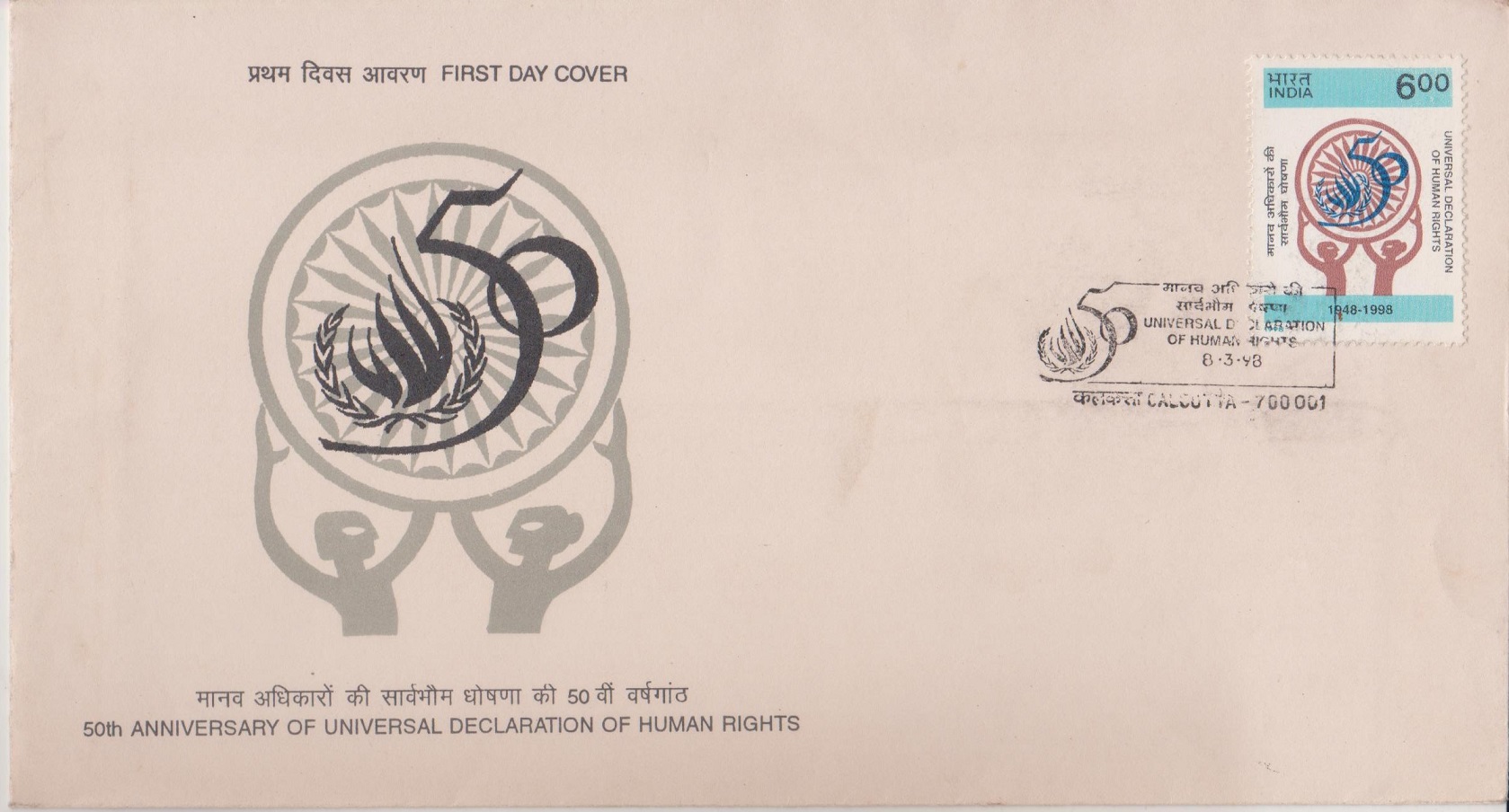

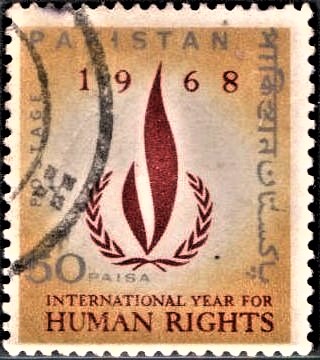

[…] months of their internship in a village was established. She has frequently represented India at UNESCO and WHO […]
[…] He studied the problem of primary education in India and other developing countries. Knowing this, UNESCO invited him for a conference on primary education held in Mumbai in 1952. He was placed by UNESCO […]
[…] Federation which is an international non-governmental, non-profit making organisation recognised by UNESCO. IYHF offers computerised International Booking Network (IBN) to meet the needs of this mobile and […]
[…] University of Syracuse, U.S. Government Special Award on the International Literacy Day in 1978, UNESCO Literacy Prize, […]
[…] following are the revealing words of Mr. Makaminan Makagiansar of the Directorate-General of the United Nations Educational Scientific and Cultural Organisation : “Even though he was working for several royal households, Rubens always acted as a […]
[…] Lovers of art in India have not so far had the opportunity to see the developments in art in the contemporary world. Periodical exhibitions of world art, such as are held in Venice or Paris, were not attempted so far in this country as there was no machinery or institution to undertake the responsibility. The Lalit Kala Akademi has now filled this void and has initiated the project of Triennales of contemporary international art. This venture forms a part of major projects organised under the auspices of UNESCO. […]
[…] of the prominent landmarks of the Historic City of Ahmadabad a UNESCO World Heritage site, the Sarkhej Roza is known for its rich history and reverence. The architecture […]
[…] Hindu Gods. This stepwell is constructed in Maru-Gurjara architectural style. It is recognized by UNESCO as a World Heritage […]
[…] and a balustrade surrounding the Stupa were later added in the first century B.C. Enlisted as a UNESCO World Heritage Site since 1989, it is counted among the best conserved ancient Stupas of central […]
[…] the committee drafting the United Nations Charter in 1945. Even today, LCI remains associated with UNESCO in an advisory capacity & LCI is the only NGO, whose International President has the […]
[…] of Uttar Pradesh. She was also awarded ‘Rashtriya Hindi Sewa Millennium Samman‘ by UNESCO and ‘Nari Lekhan Puraskar‘ by Rashtra Bhasha Prachar Samiti of the Govt. of Madhya […]
[…] as a protected monument of national importance. Recognising its unique architectural excellence, UNESCO has declared it a World Heritage […]
[…] cause of education and culture within the country and abroad in many ways. He represented India in UNESCO, and served as a member of its Executive Board during the years 1956-58. He travelled and lectured […]
[…] Education Commission, and in 1952 he was unanimously elected President of the General Conference of UNESCO. In 1954, the Government of India conferred on him the highest title of Bharat-Ratna. From 1949 to […]
[…] UNESCO World Heritage Convention which was established in 1972, recognised various sites of cultural and natural importance around the world. After the latest addition to the list of UNESCO World Heritage Sites, India now has 38 World Heritage Sites and that makes India the country with the 6th largest number of World Heritage Sites in the world. […]
[…] to sculptures, paintings, poetry, graphics and tapestries. In 1955, the artist was appointed by UNESCO to study and survey folk arts in India. He was awarded the Lalit Kala Academy Fellowship in 1993, […]
[…] a universal symbol of linguistic struggle of the Bengali (Bangalee) people of Bangladesh. In 1999, UNESCO declared “21st February” as International Mother Language Day, in tribute to the Language […]